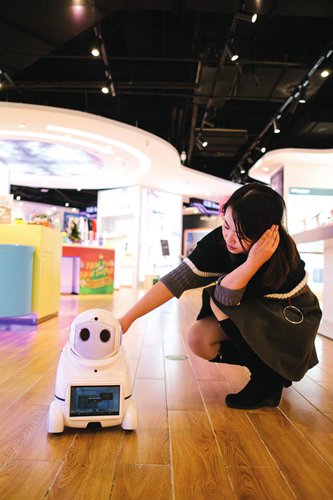
A customer interacts with a household robot in a high-tech product store. (Photo: Li Hao/GT)
Rapid development
"The development is super fast, and based on my retailing experience I can see the trend," said Wang Zilong, a manager of a hi-tech product store in the central shopping area in Dongzhimen, Beijing.
Wang started to sell AI devices last year. He said the change over the past year was "enormous." Last year, only 5 percent of the store's total turnover came from AI devices. But now with more than a dozen different products, AI devices account for more than 15 to 20 percent of their total sales.
"The diversity of products grew fast, and the overall function improved rapidly. The same goes for people's acceptance of AI devices," said Wang.
Now the most popular products sold offline are household robots that educate and accompany kids. Families with young children are the primary consumers, and domestic robot brands like LFLYTEK and UNISROBO are among the best selling products. Many people also buy robots for their elderly parents as gifts, according to Wang.
"In the past, people would worry about safety issues as the robots were meant to play with family members, especially kids. But now I almost forget about it since no one asks," said Wang.
He thinks the improved quality and reasonable prices make it no longer a luxury, but an ordinary product that ordinary people can buy.
Wang also found that the products make his work easier as well, as the robots in the store can act as his interpreters when he speaks to foreign customers.
Liu Hui, publicity director of IFYTEK, a high-tech giant in China, echoes Wang's sentiments. According to him, the best selling daily AI products both online and offline are Alpha Eggs (robots) and translators.
Still "not AI enough"
Despite the rapid development surrounding AI devices, it seems that there is still a long way to go before real products with "high intelligence" dominate the market. In other words, the current products are "not AI enough," some say.
"You can see that most of the AI products, say robots, are not human enough, and as for the popular robots that are well received in the market, they are all for kids, rather than adults," said Wang Pei, a senior professional in the industry.
Wang Pei thinks that the real potential customers for AI products are aged 25 to 35 and live in big cities.
He noticed a huge demand for personalized AI devices that can communicate and build an emotional connection as the "fourth single wave" hit the country.
"A more efficient and sophisticated system needs to be developed to meet the needs of the adult market, and I believe that day will come in the near future given the pace of current development," said Wang.
Huang Yuqing, the founder of MegaRobo, an AI robot company based in Beijing, holds a more reserved view.
"Although AI products have already been applied in many industries, we still have a long way to go before the real universalization of AI technology comes, especially for robots," said Huang.
He thinks the theory and hardware are not fully developed. Unlike Wang Pei, Huang focuses more on cooperative AI devices that can work for humans.
Huang and his team have already launched cooperative robots for the manufactory industry.
"I think it will take about a decade before cooperative robots enter ordinary households," Huang said.
However, Chinese professionals are much more confident about the future of AI.
"China has more Internet users, which creates more data for machine learning and a better data foundation for AI industry development compared with Western countries," said Liu Hui.
He thinks Chinese companies and international giants are entering a new era and that China's population is an advantage for product studies.
Noting that Chinese customers are very smart and high-tech friendly, Wang Pei said that simple AI products, such as audio boxes, won't survive for long in China.
"The ultimate direction is to make it more AI," he said.
His prediction already speaks to Li's experience. "The device is fun, but it is still too mechanical. I can hardly treat it like something with real intelligence. But I'm sure AI technology will bring a new lifestyle trend," Li said.


















































